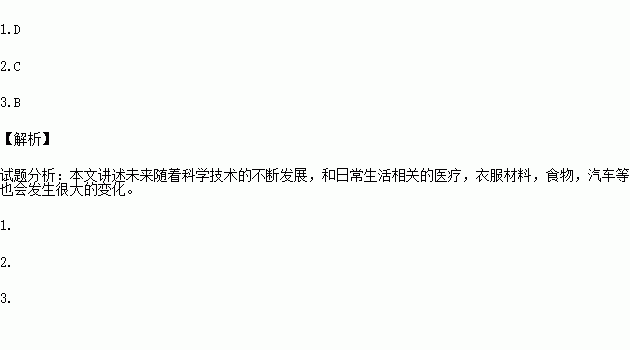题目内容
Welcome to your future life!
You get up in the morning and look into the mirror. Your face is firm and young-looking. In 2035, medical technology is better than ever. Many people your age could live to be 150, so at 40, you’re not old at all. And your parents just had an anti-aging(抗衰老的) treatment. Now, all three of you look the same age !
You say to your shirt, “Turn red.” It changes from blue to red. In 2035, “smart clothes” contain particles(粒子) much smaller than the cells in your body. The particles can be programmed to change your clothes’ color or pattern.
You walk into the kitchen. You pick up the milk, but a voice says, “You shouldn’t drink that!” Your fridge has read the chip (芯片) that contains information about the milk , and it knows the milk is old . In 2035, every article of food in the grocery store has such a chip.
It’s time to go to work. In 2035, cars drive themselves. Just tell your “smart car” where to go. On the way, you can call a friend using your jacket sleeve(袖子). Such “smart technology” is all around you.
So will all these things come true? “For new technology to succeed,” says scientist Andrew Zolli , “it has to be so much better that it replaces what we have already.” The Internet is one example --what will be the next?
1.We can learn from the text that in the future__________.
A.people will never get old
B. everyone will look the same
C. red will be the most popular color
D. clothes will be able to change their pattern
2.What can be inferred from Paragraph 4?
A. Milk wi ll be harmful to health.
ll be harmful to health.
B. More drinks will be available for sale.
C. Food in the grocery store will carry electronic information.
D. Milk in the grocery store will stay fresh much longer.
3.What is the text mainly about?
text mainly about?
A. Food and clothing in 2035.
B. Future technology in everyday life.
C. Medical treatments of the future.
D. The reason for the success of new technology.

